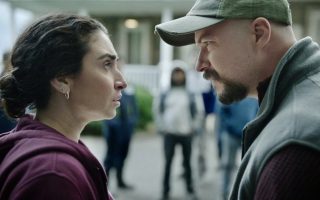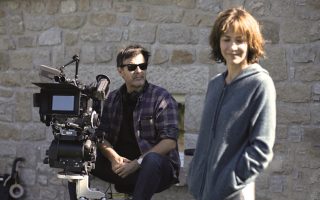French Cinema: Interview with Actor Daniel Auteuil

The French legend opens up about the beauty of being ugly and tells Lise Pedersen how his career has always been guided by joy
“Something had to go wrong. Everything is so perfect at this festival, I am delighted to be the first mistake,” quips Daniel Auteuil as sound and image fail to synchronise on the opening film of his masterclass at the Lumière film festival in Lyon. Exuding charm, charisma and comical self-deprecation, the 69-year-old actor/director is on form as guest of honour at the 11th edition of the festival, which celebrates film classics from around the world in the city where the cinematograph was invented.
A legend in France, with more than 60 films to his name, Auteuil has always shared his time between the screen and the stage. He was born in January 1950 into a family of artists in what was then French Algeria, where his opera-singing parents were on tour with their opérette show. “I was in my baby basket backstage. I grew up bathed in song and music. Every time they needed a child on stage, they used me,” he smiles.
“I was born in the theatre. And I’ve always felt very comfortable on stage. The way I see it, nothing bad can happen to me there since everything is planned!” he laughs. “I never made career choices; my choices were guided by pleasure. I made all my films with the same energy and the same joy. I was lucky enough to be successful early on; that helps you to relax and to open up to others.”
So how does he feel today about the film that made him a household name in France, Claude Zidi’s 1980 cult comedy Les Sous-doués? “I stand by all my films, including that one. It made me famous; it’s lived on through generations; it’s thanks to this collective memory that I am still here.”
Best Actor
Six years later, he took on the role which changed his life forever, playing Provençal peasant Ugolin in Claude Berri’s adaptation of Marcel Pagnol’s Jean de Florette (1986). It earned him a Best Actor accolade at the César awards, and was followed by the equally popular follow-up, Manon des Sources, the same year.
“It nearly didn’t happen,” explains an amused Auteuil. “Berri said to me, ‘You’re too handsome for the part.’ It was the first time anyone had told me that! So I shaved my head and went to see the make-up artist, and when we did the screen test Claude seemed satisfied. He said to me, ‘If you’re as good an actor as you are ugly, the role is yours!”
It was a 10-month odyssey that holds a special place in Auteuil’s heart. “It was a wonderful period in my life. I met the mother (Emmanuelle Béart) of my daughter, Nelly; I played alongside the great Yves Montand and Gérard Depardieu; and I made friends for life.”
Over the course of his career, Daniel Auteuil has worked with the greatest, including André Téchiné, Agnès Varda, Michael Haneke and Claude Sautet, with whom he made Quelques jours avec moi (1988) and Un coeur en hiver (1992). “I developed a true backbone thanks to him [Sautet]. He taught me rigour; simplicity. I don’t have to think when I’m acting. I choose the people I work with and I trust them.”
La Belle Époque
It is an instinct he has followed to this day: his latest film, romantic comedy La Belle Époque, co-starring Fanny Ardant, Guillaume Canet and Pierre Arditi, is the brainchild of up-and-coming director Nicolas Bedos, who sought out Auteuil for the lead role. He plays a cartoonist in his 60s who travels back in time through a historic re-enactment service to the day he met his now-estranged wife (Ardant). The film received a warm welcome at its premiere at the Festival Lumière.
“Bedos has a true writing talent and has proven to be a great director. This film marks the birth of a great filmmaker,” says Auteuil.
Asked about his own directing ambitions, Auteuil says he still plans on shooting the third part of his Pagnol trilogy, César, following the release of Fanny and Marius in 2013. For now, he is busy, as he always is, starring in a series for France 2, which will be followed by a feature-length fiction with Gilles Lellouche in early 2020.
From France Today magazine
Share to: Facebook Twitter LinkedIn Email
Leave a reply
Your email address will not be published. Required fields are marked *



